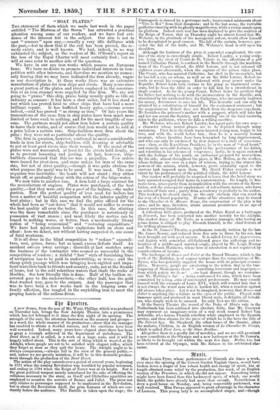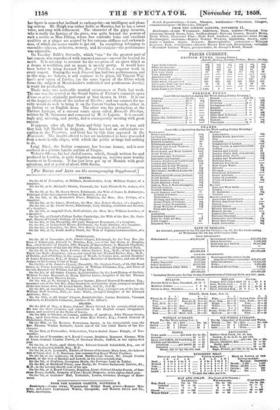3Ensir.
Miss Louisa Fyne, whose performance of Dinorah six times a week, ever since the opening of the Covent Garden English Opera, would have broken down a singer of less robust health and energy of spirit, has at length obtained some relief by the production, this week, of an English version of the Trovatore, in which she did not appear. Something better might have been found than this hackneyed opera, of which, one would think, the public have already had more than enough. Nevertheless it drew a good house on Monday, and, being respectably performed, was well received. Miss Parepa appeared to great advantage in the character of Leonora. This young lady is an accomplished singer, and—though her figure is somewhat inclined to embonpoint—an intelligent and pleas- ing actress. Mr. Haigh was rather feeble as Manrico, but he has a sweet voice, and sang with refinement. The character of the gipsy Azucena, who is really the heroine of the piece, was quite beyond the powers of such a novice as Miss Pilling, whose fine contralto voice and excellent qualities as a singer are marred by her extreme stiffness and awkward- ness, of which she seems unable to get rid. In everything belonging to ensemble—chorus, orchestra, scenery, and decorations—the performance was admirable.
On Tuesday Balfe's Satanella, which "ran " for the greatest part of last season, was reproduced with renewed success—success far beyond its merit. It is not easy to account for the reception of an opera which as a drama is worthless, and as music is merely pretty. It would have been better to bring forward The Rose of Castille, a superior work in every respect. During the week .Dinorah has had two performances, and in this way, we believe, it will continuo to be given, till Vincent Wal- lace's new opera of Lori/no, (on the same legend of the Rhine which forms the subject of Mendelssohn's unfinished and posthumous .Lorely,) is ready for production.
There were two noticeable musical occurrences at Paris last week. The one was the revival at the Grand Opera of Flotow's romantic opera L'ante en peinc, originally performed at that theatre in 1846. It is one of the happiest efforts of the author of Martha ; and our caterers for no- velty would do well to bring it on the Covent Garden boards, either in an Italian or an English dress. The other was the production. at the Theatre Lyrique, of a one-act comic opera called Mamzelle Alndope, written by M. Boisseaux and composed by M. de Lajarte. It is exceed- ingly gay, amusing, and pretty, and is consequently meeting with great success.
It appears, after all, that Mario and Grisi have not, as it was said they had, left Madrid in dudgeon. Mario has had an enthusiastic re- ception in the Tl•onatore, and Grisi has by this time appeared in the Huguenots. The insults offered to her are understood to have proceeded from a more hostile clique, with which the public at large had nothing to do.
Luigi Ricci, the Italian composer, has become insane, and is now confined in a private lunatic asylum at Prague. Weber's Oberon, his last chef-d'oeuvre, which, though written for and produced in London, is quite forgotten among us, receives more worthy treatment in Germany. It has just been got up at Munich with great splendour, and at a cost of above 6000 florins.



































 Previous page
Previous page